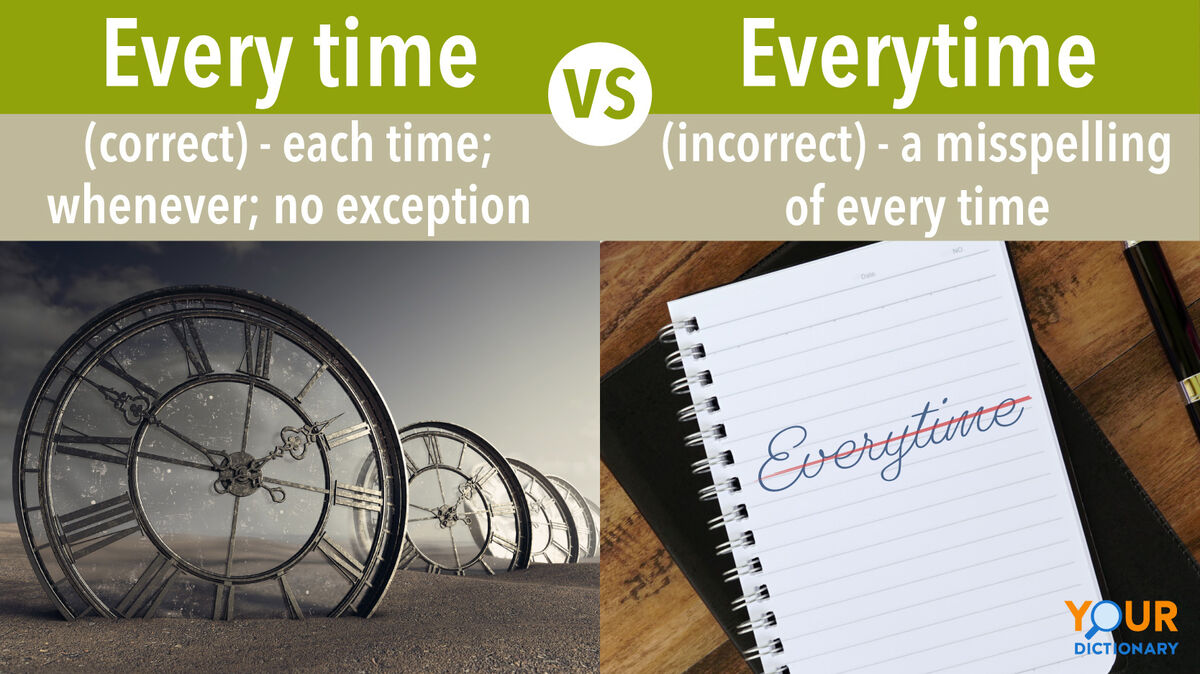Everytime or every time both refer to each occurrence or instance of an event or action, but every time is the more widely accepted and standard form in written and formal communication.
The terms every time and every time are quite similar in sound and meaning, but they differ in terms of grammatical correctness and usage in the English language.
When is every time used?
Every time is the grammatically correct form and is used to indicate each occurrence of an event or action in a repeated or regular sequence.
Example sentences
- Every time I hear that song, it brings back memories of our summer vacation.
- She smiles every time she sees her adorable puppy.
- Every time he opens the fridge, he hopes to find some leftover pizza.
- Every time the phone rings, my heart skips a beat, hoping it's good news.
- Every time it snows, the children rush outside to build snowmen.
- I learn something new every time I read a book by that author.
- Every time we visit the beach, we collect seashells as souvenirs.
- She gets a little teary-eyed every time she watches a touching movie.
- Every time he tries to fix the car, it seems to break down even more.
- We meet up for coffee every time we're both in town.
When is everytime used?
Everytime is not considered correct in standard English. It is a common misspelling or informal variation of "every time." While it might be used informally in casual conversation or written text, it is not accepted in formal writing or more rigorous language contexts.
Common idioms/phrases
While it is not typically part of idiomatic expressions, it is commonly used in phrases and sentences to convey various meanings and contexts. Here are some examples:
- Every time one turns around: This phrase is used to describe something that happens very frequently or repetitively. For example, "It seems like every time I turn around, there's a new problem to deal with."
- Every time of the year: This expression indicates that something is suitable or enjoyable at any season or time of the year. For instance, "The beach is beautiful every time of the year."
- Every time without fail: This phrase emphasizes the reliability or consistency of an action. For example, "He arrives at the office every time without fail."
- Every time you turn around: Similar to the first example, this phrase is used to describe frequent or recurring events or situations. For instance, "Every time you turn around, there's a sale happening at that store."
- Every time of the day/night: This expression indicates that something is available, possible, or enjoyable during any part of the day or night. For example, "The city comes alive every time of the night with its vibrant nightlife."
- Every time you look at it: This phrase is used when discussing something that is evident or noticeable upon examination or observation. For instance, "Every time you look at this painting, you notice new details."
- Every time it rains, it pours: This saying is used to describe a situation where multiple problems or challenges occur simultaneously or in quick succession, often emphasizing the idea that difficulties tend to come all at once.
- Every time you say that: This phrase is used when someone repeats a statement or excuse that is not believed or is unconvincing. For example, "Every time you say that, I have a hard time believing it."
While "every time" is not part of idiomatic expressions, it is a versatile phrase that can be used to convey a range of meanings related to regularity, consistency, and occurrence.
In essence, "every time" is the standard and grammatically correct form used to indicate regular occurrences or events, whereas "everytime" is an incorrect variant that should be avoided in formal writing. To ensure clear and accurate communication, it is advisable to use "every time" in your writing and speech.
Discover more about the AI English proofreader, Engram!















